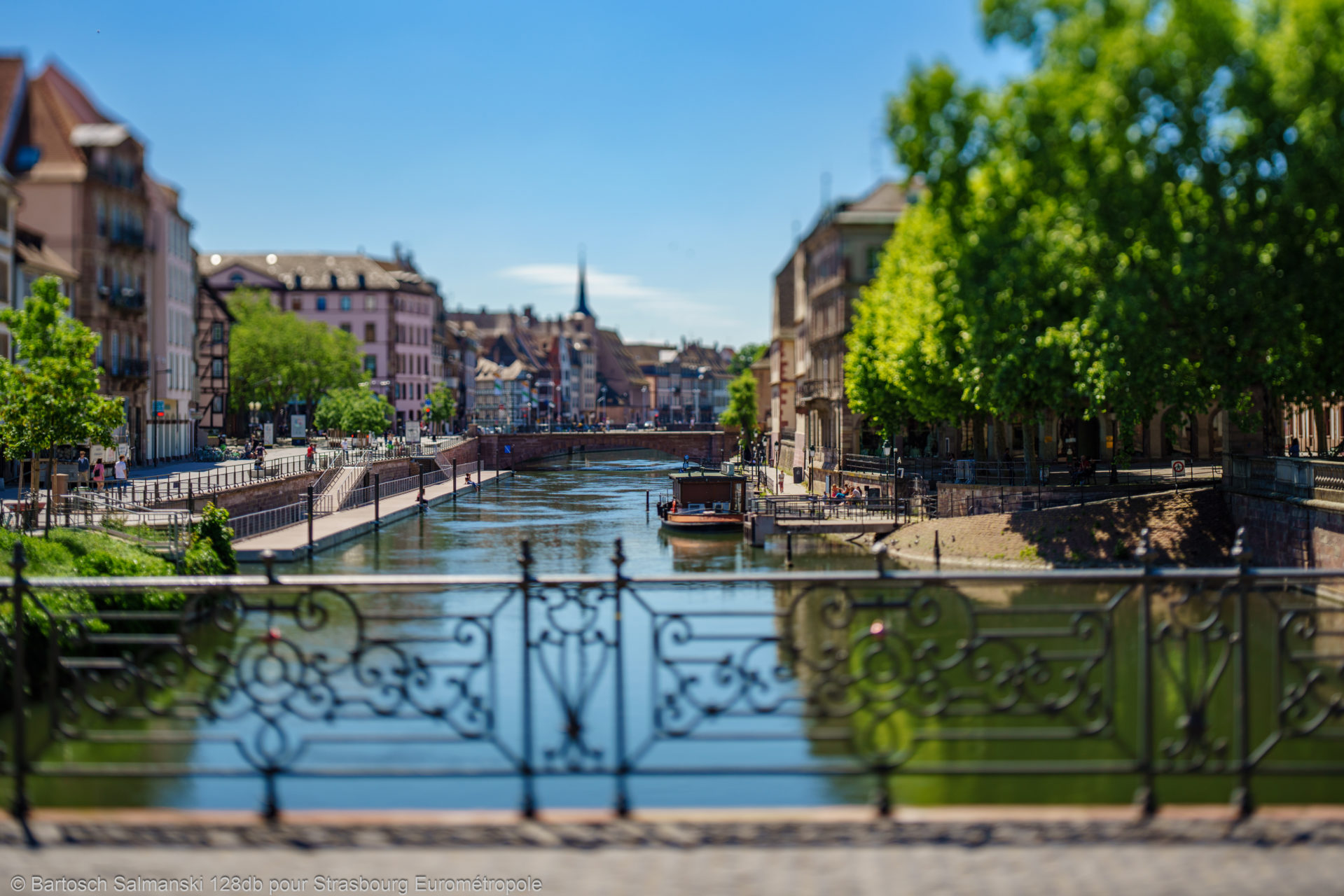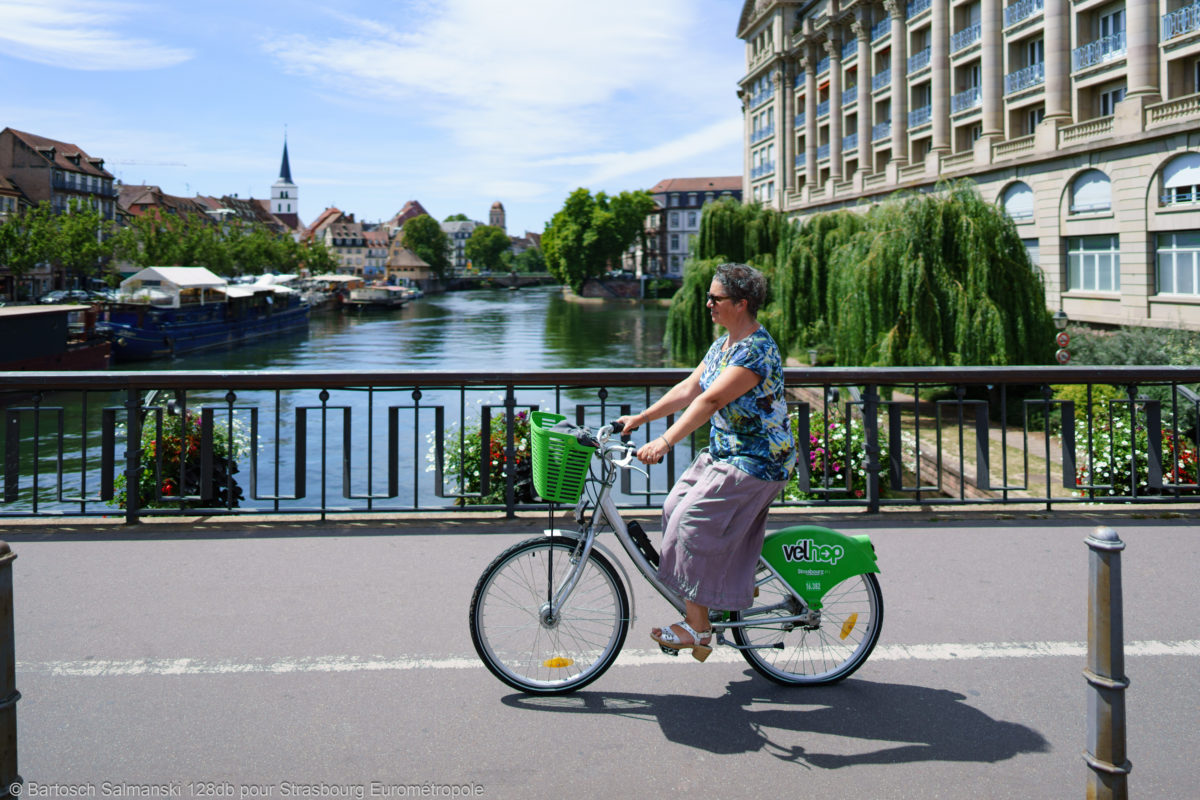The best influencers for Strasbourg and the Eurometropolis are the citizens themselves, 86% of whom readily recommend the city.¹
What they especially appreciate is the efficiency of the public transport system, the vibrancy of the cultural scene and the attractiveness of the environment. The city is also among the top 10 most attractive cities for employee satisfaction (LinkedIn) and ranked the 5th most attractive metropolis in France by active employees. Strasbourg is in a genuinely welcoming region, with a firmly international outlook and shared borders with Germany and Switzerland. The region can boast the highest concentration of major companies and SMEs, while its industry represents 30% of GDP.
Strasbourg is also a prime destination for jobseekers, with job opportunities available in a wide range of companies. Keep an eye on the specialist jobseeker websites – the city’s Strasbourg Eco-2030 roadmap is set to create 27,000 new jobs over the next 10 years.
The lines are shifting, and they’re shifting fast, but watch out – once you’ve settled in Strasbourg, you’ll never want to leave again!
Why come to work in Strasbourg?
Strasbourg, the most attractive metropolis
In 2019, the well-known French topical affairs magazine, Le Point, voted Strasbourg the most attractive city in France, on the basis of 3 criteria – economic dynamism, mobility and quality of life.
A dynamic economy within the Grand Est Region
The Grand Est is the second-biggest export region in France, and boasts an excellent diversity of businesses, ranging from VSEs and SMEs to mid-caps and subsidiaries of important French and international groups. The major sectors in Alsace are headed by agri-food, electronic, electric and IT equipment, transport, pharmaceuticals and the service sector (hospitality and the social and solidarity economy). A number of top names in international business have set up in Alsace, including Lilly France, Puma, Steelcase, Adidas, the Crédit Mutuel group, Heppner, Le Coq Sportif, Fischer Scientific, Schneider Electric and 2CRSI.
Innovation in is part of Strasbourg’s DNA!
- And if ever you needed more USPs…
Alsace is the 3rd-ranked French region for new jobs in research and development and also, with its enviable number of laboratories and researchers, the 3rd-ranked region for innovation.. - Medtech and loT manufacturing are particularly important sectors and receive considerable backing from the local authorities.
- Alsace has 4 competitiveness clusters: BioValley France (therapeutic innovation), Fibres-Energivie (sustainable building), Hydreos (water and ecosystem quality) and Véhicule du futur (sustainable mobilities), while a fifth cluster dedicated to geosciences, water, the environment and engineering is set to open for business soon.
- Strasbourg’s economic development and business growth are boosted by a number of networks, including incubators, business angels and a range of business parks.
Thinking, cooperating, making
With 5 Nobel prize winners working in the city, a European campus of medical technologies, 60,000 students, 14 grandes écoles and 15,000 academics, Strasbourg and the 33 municipalities of the Eurometropolis are a major hub and supporter of innovation and firm believers in the virtues of cross-disciplinary cooperation.
At a time when our world is under pressure to change its consumption patterns, Strasbourg is a driving force for the social and solidarity economy, the circular economy, periurban agriculture and short supply chains. These are thriving economic drivers, which form the focal point of the local Territoire Zéro Déchet Zéro Gaspillage zero waste strategy and account for some 10% of jobs in eastern France. With the support of inhabitants seeking to reshape their consumption and lifestyle, shopkeepers and restaurants actively encouraging short supply chains and recycling, non-profit organisations with a high social added value, including Envie, Siel Bleu, Libre Objet and Sikle and cooperatives such as the Citiz car sharing initiative and the future KaléidosCOOP cross-border centre for cooperation, the City of Strasbourg is a committed supporter of alternative systems for building the world of tomorrow. And with the election of Strasbourg as European capital of the SSE in 2019, things are beginning to speed up!
Education, a significant advantage
The University of Strasbourg is officially credited with the University of Excellence label and works closely with companies within the region for the transfer of skills and knowledge and also for vocational training. Students can also follow degree courses in many local schools and colleges and the 5 Alsatian University technical institutes (IUT), the HEAR arts school or one of the 14 grandes écoles of the AlsaceTech network. Strasbourg can boast an extensive bilingual educational syllabus, from kindergarten up to the baccalaureate, in addition to its European School. Young graduates seeking their first job will find a local job market geared to giving them their initial experience in the job market and helping them stay in Strasbourg.
A well-balanced territory with an excellent quality of life
Strasbourg is a city which has successfully managed to keep its human scale, striking the ideal balance between its inhabitants’ professional and personal lives. Its urban neighbourhoods, pedestrianised city centre and many green areas and parks make it a city with an enviable quality of life.
Public transport and mobilities are innate to the city
Alsace has an excellent transport network, which includes 2 international airports and, uniquely, 2 HGV high-speed train lines, as well as an extensive regional train system. Green transport plays a significant role in city life and Strasbourg has the largest network of cycle tracks in France and an internationally-envied 77 km tram system which stretches over the border into Germany. The canals leading in and out of the city have been developed for both commercial and leisure purposes, while the Rhine river, which runs between Strasbourg and Kehl on the German side, is Europe’s largest commercial waterway.
Shared workspaces
If you’re part of a mobile workforce or if your work means you don’t have a regular office, Strasbourg makes it easy for you to stay productive. The city offers a wide range of co-working facilities, third places, meeting rooms and shared offices to allow you to work in peace and quiet.
Getting out and about
One third of executives working in Strasbourg stress the ease of getting out and about as one of the major advantages of living in the city. Come the weekend or holidays, the Vosges mountains or the Black Forest offer superb backdrops for hiking or skiing, while the Northern Vosges Regional Nature Park and the Alsace wine route are just two of many attractions 30 minutes away from the city, not to mention Strasbourg’s own parks and three nature reserves.
A great cultural scene!
The local cultural scene features extensive venues, such as the Strasbourg National Theatre (TNS), the Opéra national du Rhin, and a vibrant programme of over 9000 cultural events every year, with a significant focus on contemporary creation (Ososphère, Musica, St-art…), and a great range of regular events organised by the Eurometropolis in all the city’s districts.
Finding a job – you won’t find yourself alone!
You want information, you’re new to the job market or you’re moving to Strasbourg and looking for a job in the city? There are lots of places you can go for help, starting with websites such as the Agence d’attractivité d’Alsace (the regional office for promoting the attractiveness of Alsace), APEC and ADIRA, or specialist jobseeker websites, including Régionsjob, emploi Alsace and Est Job. You can also go through a private company to prepare your arrival in Strasbourg and manage the logistics, taking a weight off your mind to allow you to explore the city’s possibilities.
In Strasbourg, you won’t find yourself having to manage alone! Newcomers to the city can use the many organisations set up to help them, such as Résoptimist, Mums’in, bienvenue à Strasbourg, Alsace digitale, and the CJD centre for young executives.
If you’re looking to set up or purchase a business, the Be EST Entreprendre network provides expert assistance and guidance at every stage of the process.

“Everyone works for each other here. Unlike in Paris, where you’re just seen as a number, there’s a kind of family-like atmosphere in Strasbourg, with everybody working together. Information is passed on quickly and efficiently and it’s much easier to make use of the ecosystem.”
Living in Strasbourg and working in Germany
It’s perfectly normal for people living in Strasbourg to work in Germany and Switzerland! The Grand Est Region has the largest proportion of cross-border workers in France, with 160,000 people crossing the Rhine every day.
The local German job market currently has some 3000 vacancies for technicians and engineers. If you’re nervous about looking for jobs in Germany, once again, you won’t find yourself alone! The Pöle Emploi job centre prepares you for cross-border working and offers assistance with finding a job in Germany.
Source : 1 2022 figure: www.hellowork.com






